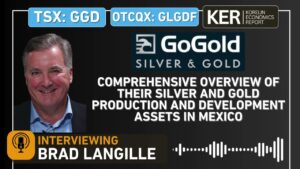VANCOUVER, British Columbia, May 08, 2019 (GLOBE NEWSWIRE) — Alio Gold Inc. (TSX, NYSE AMERICAN: ALO) (“Alio Gold” or the “Company”) today reported its first quarter 2019 results.
First Quarter 2019 Highlights
- Gold production1 of 23,231 ounces at all-in sustaining cost1,2 (“AISC”) of $1,278/oz.
- Net earnings of $1.6 million, or $0.02 per share.
- Cash provided by operating activities was $2.5 million.
- Cash and investments of $18.9 million, working capital3 of $64.2 million as of March 31, 2019.
- Completed an updated NI 43-101 Technical Report for the Florida Canyon Mine.
“The first quarter came in slightly lower than expected as a result of severe winter weather conditions at Florida Canyon and low equipment availability,” said Mark Backens, President and CEO. “With an aged fleet we are reviewing the most cost-effective way to increase the availability at site. Our focus at Florida Canyon is on increasing productivity and lowering our costs across a number of areas where we see potential to make significant improvements including the mining efficiency, mine planning and increased ore in process.”
Production and Financial Summary
| ($ thousands, except where indicated) | Three months March 31 | ||||
| 2019 | 2018 | ||||
| Gold sold (ounces) | 23,986 | 17,449 | |||
| Silver sold (ounces) | 14,404 | 5,826 | |||
| Metal revenues | $ | 31,405 | 23,338 | ||
| Production costs, excl. depreciation and depletion | $ | 26,453 | 15,514 | ||
| Net earnings from operations | $ | 671 | 3,651 | ||
| Net earnings | $ | 1,601 | 3,230 | ||
| Net earnings per share, basic | $ | 0.02 | 0.07 | ||
| Cash flows provided by (used in) operating activitiesa | $ | 2,525 | (1,826 | ) | |
| By-product cash costs1,4 (per ounce) | $ | 1,094 | 884 | ||
| AISC1,2 (per ounce) | $ | 1,278 | 1,262 | ||
| Average realized gold price per gold ounceb | $ | 1,300 | 1,332 | ||
a After changes in non-cash working capital
b The average realized gold price includes realized gains (loss) on derivatives only in Q1 2019
Florida Canyon Mine (100%-owned)
The Florida Canyon Mine produced 12,263 gold ounces and 8,648 silver ounces in Q1 2019 compared to 12,922 gold ounces and 8,590 silver ounces during Q4 2018. Gold production decreased as a result of the winter weather conditions in February and low overall equipment availability resulting in lower crusher production. During Q1 2019 the mine’s by-product cash cost and AISC was $1,110 per ounce and $1,220 per ounce, respectively. This compares to Q4 2018 by-product cash cost and AISC of $1,083 per ounce and $1,220 per ounce, respectively.
Work continues to evaluate numerous opportunities to increase production and reduce costs from historic levels. Areas of primary focus are improving mining and mine fleet efficiency, improved mine planning functions which are expected to result in more efficient mining practices and grade optimization, exploitation of low strip ratio ore, increased ore in process by improved efficiency in crushing and possible inclusion of run-of-mine ore to the heap leach pad.
Subsequent to Q1 2019, the Mine Safety and Health Administration (“MSHA”) completed a routine inspection at the Florida Canyon Mine. As a result of the inspection, a portion of the mining fleet was taken out of service to address deficiencies with respect to fluid leaks present on the equipment. The Company voluntarily removed the majority of the fleet from service to address similar issues and ensure a safe operating standard on all equipment. Mine production continues to be negatively affected as a result of the mechanical down time. Crushing activity has also been negatively affected resulting in a reduction of the ore tonnes processed. As at May 7, 2019, Florida Canyon continues to experience low availability of the mining equipment and the Company is currently working to rectify the problem. As a result, production for Q2 2019 will also be negatively affected. The Company is actively pursuing alternatives to improve the outlook.
The Company expects to see improvement in production and costs over the course of this year but at this time formal guidance is not possible until further work is completed with respect to the mine plan and the ultimate outcome of improvement in mining equipment availability.
Planned capital expenditures in 2019 total approximately $13.5 million and will primarily be employed for construction of Phase 2 of the heap leach pad and construction of a storm water diversion system to address permitting requirements.
The Company completed a NI 43-101 compliant technical report that was filed on www.sedar.com and the Company’s website on February 12, 2019. The technical report included an update to the Mineral Reserves and Resources, a revised mine plan and recommendations on improvements to increase production and lower costs. Included in these recommendations was the required work to bring the adjacent Standard Mine into production as well as to further investigate the known sulphide deposit beneath the oxide resource through a potential strategic partnership. The highlights of the new mine plan include:
- After-tax NPV5% of $105 million based on a $1,300 per ounce gold price
- Proven and Probable Mineral Reserves of 1.01 million ounces gold (85.9 million tonnes at 0.37 g/t gold) based on a pit designed to maximize project economics at $1,250/oz gold price
- Life of mine (“LOM”) gold production of 734,000 ounces with a 9.8-year mine life
- LOM free cash flow of $138 million, after tax, at $1,300/oz gold
- Capital expenditures of $81.9 million expected over the LOM, including replacement of mining fleet
- LOM cash costs of $903 per ounce of gold and all-in sustaining costs of $1,058 per ounce of gold
- LOM gold recovery of 71%
Further potential upside value to the LOM will be investigated during 2019. The LOM includes the assumption the existing CAT 785 fleet is replaced over a period of time with new equipment. The Company will be evaluating alternative options to reduce the sustaining capital requirements as well as potentially reducing the truck size to CAT 777’s to allow narrower ramps in the pits which ultimately will reduce the LOM strip ratio.
San Francisco Mine (100%-owned)
The San Francisco Mine in Q1 2019 produced 10,968 gold ounces and 6,274 silver ounces compared to 17,624 gold ounces and 8,997 silver ounces during Q1 2018. Gold and silver production was lower as a result the cessation of open pit mining activity and low-grade stockpile material being processed through the crushing circuit.
The by-product cash cost and AISC in Q1 2019 was $1,076 per ounce and $1,154 per ounce, respectively. This compares to Q1 2018 by-product cash cost and AISC of $884 per ounce and $1,137 per ounce, respectively. The increase in cash cost and AISC was due to fewer ounces produced, offset by lower production costs.
In January 2019, the Company made the decision to stop active mining in the San Francisco pit and focus on processing the low grade stockpile, as a result of the San Francisco pit not meeting planned ore production rates at an acceptable strip ratio in the upper levels of the planned pit laybacks. The Company investigated a number of mine planning options to potentially restart active mining however, while the options were economic the Company does not have the ability to fund the capital required for the various options. As a result the decision was made to continue leaching and processing low grade ore from the stockpiles until the end of the year at which time the stockpiles are expected to be depleted. Following the depletion of the stockpiles the operation will go into residual leach.
Financial performance
Metal revenues for Q1 2019 were $31.4 million, this compares to Q1 2018 metal revenues of $23.3 million. Increased revenues were the result of the addition of the Florida Canyon Mine production.
Production costs, which comprise the full cost of operations excluding depreciation and depletion, form a component of cost of sales and for Q1 2019 were $26.5 million. This compares to Q1 2018 production costs of $15.5 million. The increase was primarily as a result of the mining costs associated with Florida Canyon.
Depletion and depreciation costs for Q1 2019 were $2.4 million, this compares to Q1 2018 depletion and depreciation costs of $1.3 million. The increase was a result of the costs associated with Florida Canyon.
Net earnings for the Company for Q1 2019 was $1.6 million. This compares to net earnings of $3.2 million in Q1 2018. The decrease was primarily a result of lower earnings from operations.
Cash and cash equivalents at March 31, 2019, were $18.9 million. During the first quarter, cash provided by operating activities was $2.5 million. The Company invested $0.9 million at the San Francisco Mine, $1.3 million at the Florida Canyon Mine and $2.8 million at the Ana Paula Project.
Working capital at March 31, 2019 was $64.2 million.
Please refer to the Company’s financial statements, related notes and accompanying Management Discussion and Analysis for a full review of the San Francisco and Florida Canyon operations and Ana Paula project. This can be viewed on the Company’s website at www.aliogold.com, on SEDAR at www.sedar.com and EDGAR at www.sec.gov.
About Alio Gold
Alio Gold is a gold mining company, focused on production, exploration and development of gold mining projects in Mexico and the USA. Its principal assets include its 100%-owned and operating San Francisco Mine in Sonora, Mexico, its 100%-owned and operating Florida Canyon Mine in Nevada, USA and its 100%-owned development stage Ana Paula Project in Guerrero, Mexico. The Company also has a portfolio of other exploration properties located in Mexico and the USA.
Footnotes:
- Production and costs include the San Francisco Mine and the Florida Canyon Mine
- Non-GAAP Measure: All-in sustaining cost per gold ounce
The Company has adopted an all-in sustaining cost per ounce on a by-product basis performance measure which is calculated based on the guidance note issued by the World Gold Council. Management uses this information as an additional measure to evaluate the Company’s performance and ability to generate cash.
All-in sustaining costs on a by-product basis include total production cash costs, corporate and administrative expenses, sustaining capital expenditures and accretion for site reclamation and closure costs. These reclamation and closure costs represent the gradual unwinding of the discounted liability to rehabilitate the area around the mine at the end of the mine life. The Company believes this measure to be representative of the total costs associated with producing gold; however, this performance measure has no standardized meaning. As such, there are likely to be differences in the method of computation when compared to similar measures presented by other issuers.
The following table provides a reconciliation of the all-in sustaining cost per gold ounce on a by-product basis to the consolidated financial statements for the three months ended March 31:
| Three months ended Mar 31, | ||||||
| 2019 | 2018 | |||||
| Production costs | $ | 26,453 | $ | 15,514 | ||
| Corporate and administrative expenses (1) | 1,869 | 2,113 | ||||
| Sustaining capital expenditures (2) | 2,253 | 4,414 | ||||
| Accretion for site reclamation and closure | 312 | 76 | ||||
| Less: By-product silver credits | (223 | ) | (93 | ) | ||
| All-in sustaining costs | 30,664 | 22,024 | ||||
| Divided by gold sold (ozs) | 23,986 | 17,449 | ||||
| All-in sustaining cost per gold ounce on a by-product basis | $ | 1,278 | $ | 1,262 | ||
- Corporate and administrative expenses adjusted for the three months ended March 31, 2018, to remove Rye Patch transaction costs of $0.8 million.
- For the three months ended March 31, 2019, sustaining capital expenditures includes deferred stripping at the San Francisco Mine of $nil (three months ended March 31, 2018 – $2.7 million).
- Working capital is calculated by deducting current liabilities from current assets
- Non-GAAP Measure: Cash cost per gold ounce and cash cost per gold ounce on a by-product basis
Cash cost per gold ounce and cash cost per gold ounce on a by-product basis are non-GAAP performance measures that management uses to assess the Company’s performance and its expected future performance. The Company has included the non-GAAP performance measures of cash cost per gold ounce and cash cost per gold ounce on a by-product basis throughout this document. In the gold mining industry, these are common performance measures but they do not have any standardized meaning. As such, they are unlikely to be comparable to similar measures presented by other issuers.
Management believes that, in addition to conventional measures prepared in accordance with GAAP, certain investors use this information to evaluate the Company’s performance and ability to generate cash flow. Accordingly, presentation of these measures is to provide additional information and should not be considered in isolation or as a substitute for measures of performance prepared in accordance with GAAP.
The cash cost per gold ounce is calculated by dividing the operating production costs by the total number of gold ounces sold. The cash cost per gold ounce on a by-product basis is calculated by deducting the by-product silver credits per gold ounce sold from the cash cost per gold ounce. The following table provides a reconciliation of the cash cost per gold ounce and cash cost per gold ounce on a by-product basis to the consolidated financial statements for the three months ended March 31:
| Three months ended Mar 31, | ||||||
| 2019 | 2018 | |||||
| Production costs | $ | 26,453 | $ | 15,514 | ||
| Divided by gold sold (ozs) | 23,986 | 17,449 | ||||
| Cash cost per gold ounce | 1,103 | 889 | ||||
| Less: By-product silver credits per gold ounce (1) | (9 | ) | (5 | ) | ||
| Cash cost per gold ounce on a by-product basis | $ | 1,094 | $ | 884 | ||
- Management determined that silver metal revenues, when compared to gold metal revenues, are immaterial and therefore considered a by-product of the production of gold. For the three months ended March 31, 2019, total by-product silver credits were $0.2 million (three months ended March 31, 2018 – $0.1 million).
For further details on the calculation of production costs, refer to the notes to the consolidated financial statements. Cash cost per gold ounce and cash cost per gold ounce on a by-product basis are not necessarily indicative of earnings from operations or cash flow from operations as determined under GAAP. Other companies may calculate these measures differently. Working capital is calculated by deducting current liabilities from current assets.
Cautionary Note Regarding Forward-Looking Statements
Certain statements and information contained in this news release constitute “forward-looking statements” within the meaning of applicable U.S. securities laws and “forward-looking information” within the meaning of applicable Canadian securities laws, which we refer to collectively as “forward-looking statements”. Forward-looking statements are statements and information regarding possible events, conditions or results of operations that are based upon assumptions about future economic conditions and courses of action. All statements and information other than statements of historical fact may be forward-looking statements. In some cases, forward-looking statements can be identified by the use of words such as “seek”, “expect”, “anticipate”, “budget”, “plan”, “estimate”, “continue”, “forecast”, “intend”, “believe”, “predict”, “potential”, “target”, “may”, “could”, “would”, “might”, “will” and similar words or phrases (including negative variations) suggesting future outcomes or statements regarding an outlook.
Forward-looking statements in news release include, but are not limited to, statements which relate to future events. Such statements include estimates of future gold prices, current and future gold production at the Florida Canyon Mine, the LOM of the Florida Canyon Mine, revenue and cash flows generated by the operation of the Florida Canyon Mine, operating, capital, cash, closure and all in sustaining costs associated with the Florida Canyon Mine, gold grades and recovery at the Florida Canyon Mine, mining rates, strip ratios at the Florida Canyon Mine and future taxes payable by the Company and its subsidiaries; the Florida Canyon Mine mineral resource and reserve estimates; and estimates, forecasts and statements with respect to mine plans and designs, including with respect to the replacement of the Florida Canyon mining fleet, the expansion to the leach pad and key infrastructure around the crushing circuit at the Florida Canyon Mine and the benefits expected to be derived therefrom, the restart of the Standard Mine and potential future production growth resulting therefrom, plans with respect to the sulphide deposit at the Florida Canyon Mine and the benefits expected to be derived therefrom and planned activities to improve reliability and operating efficiency and reduce operating and sustaining capital cost requirements at the Florida Canyon Mine.
Such forward-looking statements are based on a number of material factors and assumptions, including, but not limited to: the successful completion of development projects, planned expansions or other projects within the timelines anticipated and at anticipated production levels; the accuracy of gold price, production, revenue, capital expenditure, cost, reserve and resource, grade, mining, strip ratio, recovery, mine life, net present value, and tax estimates and other assumptions, projections and estimates made in respect of the Florida Canyon Mine; that mineral resources can be developed as planned; interest and exchange rates; that required financing and permits will be obtained; general economic conditions, that labour disputes, flooding, ground instability, fire, failure of plant, equipment or processes to operate are as anticipated and other risks of the mining industry will not be encountered; that contracted parties provide goods or services in a timely manner; that there is no material adverse change in the price of gold, silver or other metals; competitive conditions in the mining industry; title to mineral properties costs; and changes in laws, rules and regulations applicable to the Company. Forward- looking statements involve known and unknown risks, uncertainties and other factors which may cause actual results, performance or achievements, or industry results, to differ materially from those anticipated in such forward-looking statements. The Company believes the expectations reflected in such forward-looking statements are reasonable, but no assurance can be given that these expectations will prove to be correct and you are cautioned not to place undue reliance on forward-looking statements contained herein.
Some of the risks and other factors which could cause actual results to differ materially from those expressed in the forward-looking statements contained in this news release herein by reference include, but are not limited to: decreases in the price of gold; competition with other companies with greater financial and human resources and technical facilities; maintaining compliance with governmental regulations and expenses associated with such compliance; ability to hire, train, deploy and manage qualified personnel in a timely manner; ability to obtain or renew required government permits; failure to discover new reserves, maintain or enhance existing reserves or develop new operations; risks and hazards associated with exploration and mining operations; accessibility and reliability of existing local infrastructure and availability of adequate infrastructures in the future; environmental regulation; land reclamation requirements; ownership of, or control over, the properties on which the Company operates; maintaining existing property rights or obtaining new rights; inherent uncertainties in the process of estimating mineral reserves and resources; reported reserves and resources may not accurately reflect the economic viability of the Company’s properties; uncertainties in estimating future mine production and related costs; risks associated with expansion and development of mining properties; currency exchange rate fluctuations; directors’ and officers’ conflicts of interest; inability to access additional capital; problems integrating new acquisitions and other problems with strategic transactions; legal proceedings; uncertainties related to the repatriation of funds from foreign subsidiaries; no dividend payments; volatile share price; negative research reports or analyst’s downgrades and dilution; and other factors contained in the section entitled “Risk Factors” in the Company’s annual information form dated March 19, 2019 and filed on the Company’s SEDAR profile.
Although the Company has attempted to identify important factors that could cause actual results or events to differ materially from those described in the forward-looking statements, you are cautioned that this list is not exhaustive and there may be other factors that the Company has not identified. Furthermore, the Company undertakes no obligation to update or revise any forward-looking statements included in, or incorporated by reference in, this news release if these beliefs, estimates and opinions or other circumstances should change, except as otherwise required by applicable law.
Source: ALO
For further information, please contact:
Lynette Gould
Vice President, Investor Relations
604-638-8976
lynette.gould@aliogold.com
Neither the TSX nor its Regulation Services Provider (as that term is defined in the policies of the TSX) nor the New York Stock Exchange MKT accepts responsibility for the adequacy or accuracy of this news release.
Original Article: https://www.aliogold.com/media/news-releases/press-release-details/2019/Alio-Gold-Reports-First-Quarter-2019-Results/default.aspx

















